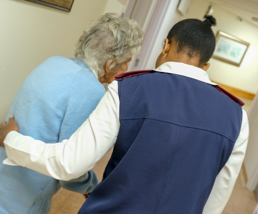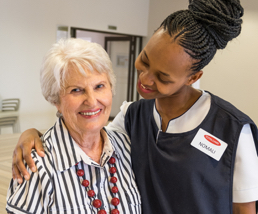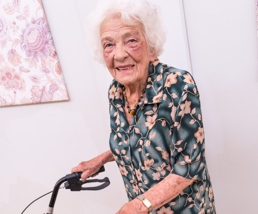
As people age, they become more susceptible to certain conditions and illnesses. In some cases, seniors are able to manage the condition on their own and live healthy independent lives. However, some conditions can’t be dealt with on their own, while others may become harder to deal with overtime. Your loved one may no longer be able to drive to doctor’s appointments or might forget to take their medication at the correct times.
By learning about the most common elderly ailments, you can recognise early signs and be prepared to deal with them, either by yourself or getting the help of care facilities like ours.
By learning about the most common elderly ailments, you can recognise early signs and be prepared to deal with them, either by yourself or getting the help of care facilities like ours.



1. Arthritis
Arthritis is a very common condition that many people over the age of 65 tend to suffer from. Arthritis is caused when tissue inside the joints starts to break down, causing pain, inflammation and difficulty moving. The most common type of arthritis in older people is osteoarthritis. This is usually caused by wear and tear of the joints. Arthritis can make everyday tasks difficult to complete. Swollen fingers make it difficult to prepare food or wash the dishes. Reaching to hang up laundry or bending down to tidy up can all become very painful. The risk of falls also increases as joints are weak and not able to support their weight. While there is no cure, arthritis can be well managed through the use of painkillers and corticosteroids.
Arthritis is a very common condition that many people over the age of 65 tend to suffer from. Arthritis is caused when tissue inside the joints starts to break down, causing pain, inflammation and difficulty moving. The most common type of arthritis in older people is osteoarthritis. This is usually caused by wear and tear of the joints. Arthritis can make everyday tasks difficult to complete. Swollen fingers make it difficult to prepare food or wash the dishes. Reaching to hang up laundry or bending down to tidy up can all become very painful. The risk of falls also increases as joints are weak and not able to support their weight. While there is no cure, arthritis can be well managed through the use of painkillers and corticosteroids.
2. Coronary Heart Disease
Coronary heart disease occurs when there is a blockage or interruption of blood flow to the heart due to a build-up of fatty substances in the coronary arteries. The main symptoms include chest pains (angina), heart failure, and heart attacks. Heart disease is often linked to unhealthy lifestyle habits such as smoking and poor diet, as well as obesity, high cholesterol, high blood pressure and diabetes. Regular exercise, a balanced diet, medication and surgery are all measures that can be taken to treat heart disease in the elderly.
Coronary heart disease occurs when there is a blockage or interruption of blood flow to the heart due to a build-up of fatty substances in the coronary arteries. The main symptoms include chest pains (angina), heart failure, and heart attacks. Heart disease is often linked to unhealthy lifestyle habits such as smoking and poor diet, as well as obesity, high cholesterol, high blood pressure and diabetes. Regular exercise, a balanced diet, medication and surgery are all measures that can be taken to treat heart disease in the elderly.
3. Stroke
Strokes are extremely serious and can be life-threatening if not treated immediately. A stroke happens when blood stops flowing into an area of the brain. When deprived of oxygen, brain cells die very quickly, which can be fatal or lead to severe disability. Knowing the early symptoms of a stroke can help ensure you seek help in time. You can use the acronym F.A.S.T to remember the symptoms as follows:
Strokes are extremely serious and can be life-threatening if not treated immediately. A stroke happens when blood stops flowing into an area of the brain. When deprived of oxygen, brain cells die very quickly, which can be fatal or lead to severe disability. Knowing the early symptoms of a stroke can help ensure you seek help in time. You can use the acronym F.A.S.T to remember the symptoms as follows:
- Face - the person might not be able to smile or their face could droop on one side.
- Arms - the person may not be able to lift one or both arms. Speech – The person may be unable to speak or have garbled, slurring speech.
- Time - the faster you seek medical help, the more chance there is of avoiding stroke complications.
4. Diabetes
Diabetes is a common disorder that affects the body’s ability to process ingested sugar. The most common type of diabetes is Type 2, which generally affects individuals over the age of 45. Due to resistance to insulin, diabetes can result in blood sugar levels that are too high. This, in turn, can lead to serious conditions such as heart attacks, strokes, nerve damage, kidney failure, and blindness. Diabetes can be treated with oral medication or injections. Healthy lifestyle practices such as a well-balanced diet and regular exercise can also help prevent further health decline.
Diabetes is a common disorder that affects the body’s ability to process ingested sugar. The most common type of diabetes is Type 2, which generally affects individuals over the age of 45. Due to resistance to insulin, diabetes can result in blood sugar levels that are too high. This, in turn, can lead to serious conditions such as heart attacks, strokes, nerve damage, kidney failure, and blindness. Diabetes can be treated with oral medication or injections. Healthy lifestyle practices such as a well-balanced diet and regular exercise can also help prevent further health decline.
5. Sight impairments
With age, the senses tend to deteriorate. A mostly treatable cause of sight loss is cataracts, which can usually be removed through surgery. Another form of sight loss is more difficult to treat. Age-related macular degeneration is a common eye condition in adults over 60. Macular degeneration is a result of the deterioration of the central part of the retina over time. This causes increasing loss of vision in the centre field of vision. There is no cure, but the condition can be improved by quitting smoking, regular exercise, a diet rich in colourful vegetables and fatty fish, and wearing eyewear to protect from ultraviolet rays.
With age, the senses tend to deteriorate. A mostly treatable cause of sight loss is cataracts, which can usually be removed through surgery. Another form of sight loss is more difficult to treat. Age-related macular degeneration is a common eye condition in adults over 60. Macular degeneration is a result of the deterioration of the central part of the retina over time. This causes increasing loss of vision in the centre field of vision. There is no cure, but the condition can be improved by quitting smoking, regular exercise, a diet rich in colourful vegetables and fatty fish, and wearing eyewear to protect from ultraviolet rays.
We understand that you want the best quality of life for your loved ones. Over time, your loved one will come to need a greater level of medical care. Should you no longer be able to manage their needs, Totalcare can provide the medical and nursing care they need for a healthy, active and fulfilling lifestyle. Our 24-hour care includes access to doctors, nurses, occupational therapists and various support services. Your loved one can choose from seven luxurious Assisted Living and Frail Care retirement villages featuring stylish rooms and excellent facilities.
You can head over to our Our villages for more information about our care facilities
If you’re caring for an elderly parent or loved one, it’s important to understand the most common health concerns for seniors as they age. A number of chronic conditions can become more severe over time, and they might need more help performing daily tasks, taking medicine or getting to doctor’s appointments. Learn more about the various illnesses and conditions most common in seniors, so you can be better prepared to provide the support they need when the time comes.
